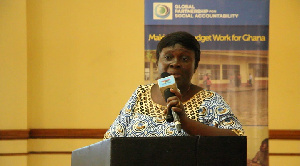 Harriet Nuamah Agyemang, Senior programme officer of SEND Ghana
Harriet Nuamah Agyemang, Senior programme officer of SEND Ghana
The government has been urged to invest in epidemic preparedness to reduce its impact on social and economic life if they occurred in the future.
SEND Ghana, a policy research and advocacy Civil Society Organisation (CSO), which made the call, argued that, failure to do so would expose Ghana to the full effects of epidemics which had the potential of derailing the country’s growth.
Harriet Nuamah Agyemang, Senior Programme Officer, SEND Ghana, said, it was imperative that efforts were made to prevent its occurrence or containing its impact by increasing funding for epidemic preparedness and response through the annual national budget.
Speaking at a media engagement in Accra Friday, she noted that, this could be achieved through a rise in the health sector annual budgetary allocation to meet international benchmarks.
The engagement formed part of a yet-to-be-launched campaign by SEND Ghana to promote investments in preparation for epidemics.
She said Ghana had already developed a national action plan for health security aimed at adequately preparing and effectively responding to epidemics.
However, the implementation of the plan had suffered setbacks due to limited or no funding dedicated to it, leaving the country unprepared for epidemics, Madam Agyemang added.
Citing the outbreak of Coronavirus in the country and its associated impact, she said, Ghana recorded huge revenue losses due to loss of man-hours through morbidity and the imposition of a lockdown.
“COVID struck us last year and we were unprepared. It took us unaware and we suffered highly for it. It is time to get serious on issues that border on the country’s health sector and make the necessary investments to curtail the impact,” she stated.
Ghana, despite its efforts, she noted, has been unable to realize the Abuja Declaration, which asks African countries to allocate 15 percent of annual budget to health.
So far, she said, the highest realized had been 12 percent while the country was currently recording an allocation of about seven to nine percent.
Madam Agyemang explained that the absence of investments was risky as a study showed that the world experienced epidemics every five to six years.
“We should be prepared for epidemics. Studies over the years have shown that epidemics are part of us. If we prepare, we won’t borrow to increase our debt stock, close borders which impede businesses and be confronted with limited access to vaccines,” she said.